Jennifer Flanders's Blog, page 19
April 17, 2019
On Cathedrals, Christianity, and Compromise

By now you’ve heard about the burning of Notre Dame. It’s all over the headlines. On every station you can see streaming footage of Paris’s smoke-filled skyline, its beautiful old cathedral ablaze. How sad to see such an exquisite and historic example of medieval architecture consumed in flames.
Yet, it’s important to remember that, from a Christian standpoint, the building where believers gather is just that – a building. This is true whether a house of worship has been around for 90 days or 900 years. The church is not made of towers and spires, arches and belfries, pulpits and pews, brick and mortar.
No, the church is made up of people. People who’ve put their faith in Jesus. People who’ve accepted the grace and forgiveness He made possible by dying on the cross for our sins and rising again from the grave.
This marvelous, redemptive work of Christ is what we’ll be celebrating on Easter Sunday, just a few days from now.
I looked up the statistics: Notre Dame Cathedral averaged 30,000 visitors a day. It was the most visited monument in Paris, surpassing even the Eiffel Tower.

Although churches normally see a spike in attendance on Easter Sunday, precious few draw crowds that size! In fact, church membership has so declined in our post-modern culture that many congregations are scrambling for ways to bolster attendance, not only on Easter, but all year long.
A few months ago, I read an article that addressed this disheartening decline in regular church attendance. The main takeaway? According to that author, evangelical Protestants need to “reconsider what parts of Christianity are non-negotiable.” From the tone of his writing, I suspect he sees a lot more room for “tweaking” the gospel message than I do.
While I appreciate the fact that our delivery methods will change over time – tent revivals and circuit preachers eventually give way to evangelical YouTube videos and social media campaigns – the gospel itself needs no revision. The good news proclaimed by the Word of God is already as simple and straight-forward as can be.
The Unadulterated Gospel:
We have all sinned. (Romans 3:23)
Our sin separates us from God. (Isaiah 52:9)
The penalty for sin is death. (Romans 6:23)
Our good works cannot save us. (Titus 3:5)
Of course, this first part of the story is actually bad news, but we must rightly understand our desperate need to fully appreciate the good news that follows:
God loves us. (John 3:16)
He desires that none die, but all come to repentance. (2 Peter 3:9)
He sent His Son Jesus to die in our place. (Romans 5:8)
Jesus, being fully God and fully man, lived a life completely free of sin. (2 Corinthians 5:21)
Yet He willingly took the punishment for all our sin upon Himself. (Philippians 2:5-8)
Jesus died an excruciatingly painful death on the cross. (Isaiah 53:3-5)
He was buried in a tomb. (Matthew 29:59)
Three days later, He rose up from the dead. (Luke 24:5-7)
He appeared to over 500 witnesses before ascending back to heaven. (1 Corinthians 15:3-6; Luke 24:50-52)
Jesus thereby purchased our salvation. (Ephesians 1:7)
This salvation comes only by grace through faith in His finished work. (Ephesians 2:8-9)
Put your faith in Jesus, and you will be saved. (Romans 10:9)
That’s the gospel in a nutshell. It is what it is. If we attempt to revise it, it will cease to be the gospel at all.
Teaching the Whole of Scripture
In 2 Timothy 3:16 we read, “All Scripture is inspired by God and profitable for teaching, for reproof, for correction, for training in righteousness.”
If, instead of teaching Scripture in its entirety, we cherrypick the feel-good, non-controversial, inspirational parts we like and we totally ignore, minimize, or contradict the harder parts about sin and death and hell and Satan’s schemes and Christ’s sacrifice and our accountability before God, then can what is left rightly be called Christianity?
I don’t think so.
Yet such a practice has become the norm in lots of congregations today. In their all-consuming desire to appear relevant to the masses, they have completely stripped the gospel of its power to change lives.
Many churches have become mere social clubs where people gather to hear motivational speakers who tickle their ears but steer clear of their consciences. (2 Timothy 4:3) They don’t teach the whole of scripture. They don’t adhere to sound doctrine. And they do their very best not to step on any toes.
It’s Sunday morning, zero-calorie “Christianity-lite,” and it has little affect on how its adherents conduct their lives on Monday through Saturday.
That’s counterfeit Christianity! And that brand of religion is worthless.
The Opposite Extreme
On the other end of the spectrum, some congregations are all about rules. They, too, ignore large portions of Scripture on grace and love and gentleness and mercy, choosing instead to stubbornly cling to the traditions of men.
Like the Pharisees, they “tie up heavy, burdensome loads and lay them on others’ shoulders.” (Matthew 23:4-7) They crave the respect and admiration of men, but they’ve hardened their hearts to the stirrings of God. They speak of holiness in public, but live like the devil in private.
This has been apparent in the unspeakably heartbreaking and gut-wrenching scandal among Catholic priests, but our Protestant churches are not immune to such hypocrisy, either.
That’s because legalism is just as dangerous a condition as liberalism. They both miss the mark.
True Christianity is not primarily about rules or relevance. It is about relationship — our broken relationship to God due to sin, and the overwhelmingly generous opportunity He offers us to enjoy a restored relationship with Him through the finished work of His blessed Son, Jesus Christ, on the cross.
The post On Cathedrals, Christianity, and Compromise appeared first on Loving Life at Home.
March 8, 2019
In Defense of Multi-Tasking
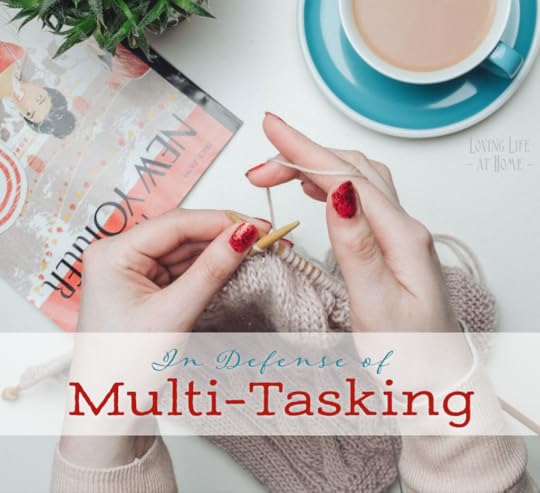
I think multi-tasking has gotten a bad rap these days.
Sure, some forms of multi-tasking are downright foolish: Texting while driving can be deadly. Mindlessly munching on junk food while watching TV is bad for your waistline.
And I know better than to try scrolling through social media, eyes glued to phone, when my husband is in the mood for a meaningful conversation. Or a hot meal or a clean house or anything else, for that matter. Doing so would be rude and disrespectful.
But aside from a handful of ill-advised pairings like the ones mentioned above, I’ve always thought multi-tasking makes a lot sense. I wouldn’t be able to accomplish half of the things I do without doubling up at times.
Multitasking done right means matching a relatively mindless activity – like jogging – with something that will increase your enjoyment and productivity – like listening to Ted Talks while lapping the block.
Modern day appliances make it easy for us to multitask. I can start dinner in the crockpot or a load of laundry in the washer and let them work their magic while I clean house or do lessons with my children. What a timesaver!
Our forefathers understood multi-tasking. They’d call all the neighbors together and build friendships while raising a barn. The women did the same with quilting bees. They’d share news, encouragement, and hearty laughs around a quilting frame while pushing their needles up then down through the thick layers of fabric and batting.
I’ve been to a couple of quilting bees and must say that I found it quite enjoyable. Here are a few more of my favorite ways to boost productivity through multitasking:
My Favorite Ways to Multi-Task
Listening to podcasts while folding clothes
With seven children still living at home, we cycle through a lot of laundry. Even though the kids and my sweet husband help out with the folding, there’s enough left for me to do that I get through several podcasts a week. Doing so keeps my mind engaged while my hands are busy.
Doing Sudoku while soaking in the tub:
I keep a book of these number puzzles handy and work one whenever I’m relaxing in a hot bath… or anytime else I’m stuck in that room for an extended period of time. 
February 5, 2019
Forgiving Those Who Hurt Us

Has anybody ever said or done something that hurt you? Does the incident play over and over in your mind, like a tape? It could be something minor or something major — a cutting remark or a complete betrayal of trust — but your heart still aches or your temper flares every time you recount it.
Or maybe your wounds fester below the surface. You can go months without thinking about it. Perhaps you assume you’re finally over the hurt. Then BOOM. Something triggers the memory and the pain rushes back in as you realize you still haven’t let it go.
Learning to Let Go
We shouldn’t let our hurts from the past steal our joy in the present. To keep that from happening, it is imperative that we learn how to fully and freely forgive the people who have wronged us. The Bible has a lot to say about forgiveness, including verses such as these:
“Be kind to one another, tender-hearted, forgiving each other, just as God in Christ also has forgiven you.” (Ephesians 4:32)
“Bear with each other and forgive any complaint you may have against one another. Forgive as the Lord forgave you.” (Colossians 3:13)
“For if you forgive men their trespasses, your Heavenly Father will also forgive you. But if you do not forgive men their trespasses, neither will you Father forgive yours.” (Matthew 6:14-15)
If I don’t forgive others, God won’t forgive me. That’s a sobering thought, isn’t it? I’m so glad God doesn’t dwell on my wrongdoings the way I sometimes perseverate on the fact my husband sent my favorite kitchen gadget to Goodwill!
Instead, God separates my sins from me “as far as the east is from the west.” (Psalm 103:12) And He calls me to reflect that same kind of grace to others.
Did He Really Mean Everybody?
Some may wonder whether God intends for us to forgive every wrongdoer in every situation. Didn’t Jesus offer us any exemptions from forgiving those who sin against us?
What if they’ve done something horribly wicked?
What if they never say they’re sorry?
What if when they do apologize, it doesn’t sound like they really mean it?
What if instead of apologizing, they shift blame?
What if they justify their actions?
What if they don’t deserve forgiveness?
What if they are unrepentant?
What if they keep right on doing the very thing I forgave them for?
I think Peter must have had some of these same questions in mind when he asked, “Lord, how many times shall I forgive my brother or sister who sins against me? Up to seven times?” (Matthew 18:21)
The disciple probably thought his offer was generous, but Jesus raised the bar substantially when He answered, “I tell you, not just seven times, but seventy times seven!” (Matthew 18:22)
In other words, don’t even try to keep track.
Why would God demand from us that kind of extravagant grace? Well, I think He does so primarily for our own benefit.
Freedom from Malice
Giving place to bitterness and resentment is bad for your health. “A joyful heart is good medicine, but a broken spirit dries up the bones.” (Proverbs 17:22) As one wise person observed, “Holding a grudge is like drinking poison and expecting the other person to die.” It hurts you far more than it hurts anyone else.
Forgiveness, on the other hand, fosters a spirit of humility and gratitude. It recognizes how great a debt God has forgiven us and chooses to emulate His amazing mercy in our relations to others.
Jesus provided us with the ultimate example when, even as He was being crucified, He prayed for his tormentors, “Father, forgive them for they know not what they do.” (Luke 23:34)
He urges us to do the same: “Love your enemies, do good to those who hate you, bless those who curse you, pray for those who despitefully use you… expecting nothing in return. Then your reward will be great, and you will be sons of the Most High; for He is kind to the ungrateful and wicked. Be merciful, just as your Father is merciful.” (Luke 6:27-36)
Test Your Heart
Have you forgiven your offenders as freely and fully as God requires? That last passage provides a great litmus test:
Can you pray for this person? Not just going through the actions, but sincerely petitioning God on his behalf? Do you deeply desire his salvation and sanctification? Would it thrill your soul to see God mercifully draw him to repentance?
God’s forgiveness does not necessarily cancel the consequences of sin. Jesus fully forgave the thief on the cross, but the thief still died a criminal’s death. Does knowing this make you gloat in anticipation or motivate you to pray all the harder?
Are you mindful of the sin in your own soul? Do you recognize the fact that, but for the grace of God, you might’ve been guilty of the same offense?
Does the knowledge that “hurting people hurt people” move you to compassion for this individual? Are you able to love him like God loves you?
Bitterness, resentment, and desolation dig a deep pit. The only way to escape such a pit is through the kind of forgiveness I’ve described above – a forgiveness that is admittedly impossible apart from God’s empowering grace.
To truly break free from all hurt and grief of our past, we must accept God’s forgiveness for our own sin, then channel that forgiveness to everyone around us – especially to those who have done us wrong.
The post Forgiving Those Who Hurt Us appeared first on Loving Life at Home.
January 22, 2019
Living Out Your Beliefs

My son Daniel is taking a worldview class at our homeschool co-op this year. Recently, his teacher tasked him with interviewing somebody whose view of the world differed substantially from his own.
For a 13-year-old boy living in the Bible belt whose primary circle of friends includes his brothers and sisters plus friends from church and a Christian co-op, this assignment presented a bit of a challenge.
However, we do happen to have a dear family friend who is an atheist. She lives and works on the other side of the world, so Daniel sent the interview questions to her in an email.
And she graciously answered.
She believes God is a figment of our imagination, credits the formation of life as we know it to evolution, and denies there is anything special about humans. According to her, humans are nothing more than soulless animals “with an unusual propensity for cruelty.”
“Making others happy is the height of goodness;” she postulates, “making others unhappy is the height of evil.”
While her answers prompted a lot of discussion, they didn’t really surprise us. What did surprise us was how much of a disconnect there seems to be between what our friend says she believes and how she actually lives her life.
She claims humans are just animals, but is rightly appalled when they act that way.
She thinks it’s evil to make others unhappy, yet considers herself a good person despite the fact that her strongly held opinions make those who disagree with her bristle.
She defines reality as “what we experience with our five senses, what we’ve learned, and what our brains tell us.” Unless, of course, our experience, education, or personal convictions point to the existence of God, in which case it’s just a bunch of nonsense and isn’t real at all.
Noting the inconsistencies between our friend’s professed beliefs and her actual behavior prompted some self-reflection. Have I ever been guilty of the same thing? That’s a valid question for everyone to consider.
If I believe, as the Bible teaches, that mankind is made in the image of God, then I should treat others with dignity and respect in every interaction.
If I affirm that God is sovereign and trust Him to work all things together for the good of those who love Him, then I should never lose sleep worrying about my problems.
If I understand that God uses life’s trials to make me more like Christ, then I should bear up under hardships with patience and joy.
If I accept the fact that Christ’s death freed me from the power of sin, then I shouldn’t live as if I were still enslaved to my appetites and vices.
And if I’m convinced that hell is real and awaits the unrepentant, then my love and compassion for the lost should motivate me to point them to Jesus every chance I get.
If you’ve never tried this exercise, I’d highly recommend it. Give some thought to your own most deeply held convictions, then ask yourself: After observing my behavior, would people be surprised to learn I believe as I do? What affect does my worldview have – if any – on the way I conduct myself day to day?
The post Living Out Your Beliefs appeared first on Loving Life at Home.
January 18, 2019
Top 10 Posts of 2018
Before we get too far into 2019, I’d like to share a round-up of my ten most popular posts from 2018. Looking at the kind of articles that drive the most traffic on my site helps me better understand my readers and the questions they’re asking.
For the purposes of this listing, I’ve included the top five of my posts that were published last year plus my top five posts of all time.
As far as those all-time most popular posts go, little has changed over the years except which of these slides in and out of first position.
If any of the following topics resonate with you, I hope you’ll click through to read the original post — especially if you missed it the first time around.
My Top 10 Posts for 2018
10. The Good News About Marriage

We all know that repeating a vow to “love, honor, and cherish for better or worse, for richer or poorer, in sickness and in health, until death do us part” counts for little unless we intentionally choose to remain faithful to that promise day after day, month after month, year after year. Thanks to their faith in God, Christians have access to a limitless supply of the grit and grace necessary to keep loving and respecting and forgiving their spouse, even when… [keep reading]
9. The Best Marriage Lessons are Taught by Example

The lack of a good example leaves a gaping hole in many folks’ understanding of what, exactly, constitutes a good marriage. At the same time, society has tossed out any kind of Biblical standard as to how husband/wife relationships were designed to work, so now we have the blind leading the blind. Even more alarming… [keep reading]
8. Praying for Your Adult Children

Child training provides ample opportunity to practice praying. To bring before God requests big and small. To beg of Him the wisdom and strength and patience we naturally lack, but desperately need to parent the children He has placed in my care. And those prayers don’t stop when our children leave home… [keep reading]
7. 9 Smart Reasons for Having Babies

[My family:]
The #postcardsforMacron Instagram campaign beautifully demonstrated an important point: Many smart women consciously choose to have a lot of children. I’d like to take the conversation one step further and show that having a lot of children is one of the best choices a smart woman can make by discussing the scientific advantages to… [keep reading]
6. 5 Things Radical Feminists got (Almost) Right

If more people lived by these five feminists slogans instead of just shouting them in the streets once a year during January’s Women’s March, the world would be a better place for everybody in it…. [keep reading]
5. Parents Need Prayer, Too

I’ve printed lots and lots of guides for wives to use in praying for their husbands and for parents to use in praying for their children of all ages and stages, but it wasn’t until I received a special request from a child for a prayer they could pray for their mom and dad that I came up with this printable… [keep reading]
4. Pray for Your Husband Head-to-Toe
And speaking of wives praying for their husbands, this head-to-toe prayer guide is still my most popular. I even spotted one of my (unmarried) daughters printing out this prayer the first of the year, to get an early start praying for her future husband… [keep reading]

3. Can a Married Woman Have Male Friends
Getting married changes a lot more than the marital status of the bride and groom — it also affects every other relationship either spouse is involved in. Marriage changes the way we relate to our family, and it also alters how we handle friendships. Not that our friends aren’t still our friends, but time spent with friends can no longer predominate our lives or free time. This is especially true when it comes to male-female friendships…. [keep reading]

2. 25 Ways to Communicate Respect
Actions speak louder than words. You can say you respect your husband, but he’ll have a hard time believing that unless your behavior backs it up. But what does respectful living look like? Here are 25 ways you can… [keep reading]

1. 5 Must-Read Books for Women Who Think
One of my readers recently criticized me for promoting what she considers oppressive and archaic beliefs regarding marriage and motherhood. “Read something – anything – on feminism,” she pleaded. “Learn to respect yourself, then you can respect others.” Of course, this is a cleaned-up version of what she actually wrote. Her original comment was so riddled… [read more]

The post Top 10 Posts of 2018 appeared first on Loving Life at Home.
January 11, 2019
Recommended Reads: My Top 10 of 2018
A couple of my New Year’s resolutions are reading goals I’ve set (and met) for several years running now. Every year, I try to read through the Bible cover-to-cover and I also try to finish a book a week of other reading.
I guess cover-to-cover may not be an accurate description on the Bible reading, given that I do most of it on the computer and use a reading plan that skips around a bit.
It groups the books by subject and rotates according to the days of the week: letters on Sunday, law on Monday, history Tuesday, Psalms Wednesday, (more) poetry on Thursday, prophecy on Friday, and gospels on Saturday. Still, it gets the job done, and by December 31, there’s nothing left for me to do but start over.
As for my other book reading, I read a good bit of fiction aloud to my children as part of our homeschooling, but the vast majority of books I read to myself are non-fiction titles. Here are ten of my favorites from last year, listed in the order that I read them:
My Top 10 Favorite Non-Fiction Reads from 2018
Your Best Year Ever: A 5-Step Plan for Achieving Your Most Important Goals
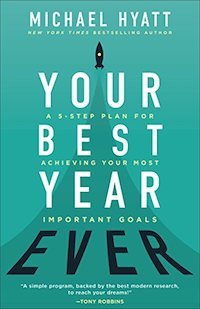 Your Best Year Ever by Michael Hyatt presents a simple, proven 5-step method for defining and accomplishing your most important goals. Hyatt offers an online course by the same name, which I took several years ago and would recommend to anybody who learns best through multi-media. But I’m a pen and paper, book loving girl all the way, and the print version offers the same great information in a form that allows me to underline, scribble notes in the margins, and reference again and again quickly and easily.
Your Best Year Ever by Michael Hyatt presents a simple, proven 5-step method for defining and accomplishing your most important goals. Hyatt offers an online course by the same name, which I took several years ago and would recommend to anybody who learns best through multi-media. But I’m a pen and paper, book loving girl all the way, and the print version offers the same great information in a form that allows me to underline, scribble notes in the margins, and reference again and again quickly and easily.
Although you’ll find this book in the business section, the principles are applicable to all of life. The grit, focused attention, and wholehearted commitment required for success in the workplace can also lead to stronger marriages and happier families when we exercise those same habits at home.
Secret Thoughts of an Unlikely Convert
 Secret Thoughts of an Unlikely Convert by Rosalie Butterfield traces a liberal atheist academic’s journey to faith. Her story offers us a powerful reminder that God is able to change hearts — even the hearts of those who, from a human standpoint, seem completely unreachable.
Secret Thoughts of an Unlikely Convert by Rosalie Butterfield traces a liberal atheist academic’s journey to faith. Her story offers us a powerful reminder that God is able to change hearts — even the hearts of those who, from a human standpoint, seem completely unreachable.
This book underscores the fact that Christians should carry the gospel into every interaction. We have no way of knowing in advance which of the seeds we plant will take root and produce fruit, so let us sow generously and faithfully, whenever and wherever God gives us the opportunity.
The couple who initially reached out to Rosalie did this gently but persistently. Not as a means of checking some obligatory task off their to-do list. Rather, they were motivated by love — love for God and for their fellow man. That kind of love shines brightly in this dark world and draws others to its source.
Plugged-In Parenting: How to Raise Media-Savvy Kids with Love, not War
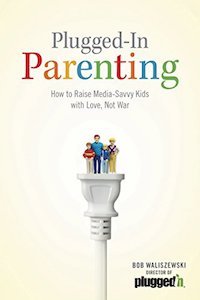 Plugged-In Parenting by Bob Waliszewski discusses practical ways parents can help their kids navigate the world of entertainment and evaluate the television, movies, and music they encounter from a Christian worldview.
Plugged-In Parenting by Bob Waliszewski discusses practical ways parents can help their kids navigate the world of entertainment and evaluate the television, movies, and music they encounter from a Christian worldview.
Since my family doesn’t own a television and infrequently listens to the radio, this book was eye-opening as to the kind of messages currently being sent to our young people through the entertainment industry. Even so, Waliszewski offers helpful advice to parents who want to help their kids apply a Biblical standard to what they watch and listen to, with the ultimate goal of having their teens and young adults internalize these principles and guidelines and use them in making their own choices in the area of media.
Everybody, Always: Becoming Love in a World Full of Setbacks and Difficult People
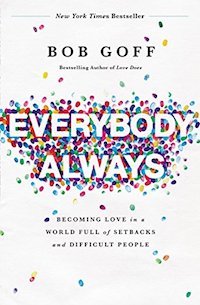 Everybody, Always by Bob Goff had me laughing out loud one minute and weeping the next – then reading and re-reading the passage aloud to family members who wanted to know what was so funny and/or touching to have elicited my guffaws or tears the first place.
Everybody, Always by Bob Goff had me laughing out loud one minute and weeping the next – then reading and re-reading the passage aloud to family members who wanted to know what was so funny and/or touching to have elicited my guffaws or tears the first place.
A fabulous storyteller, Goff gives readers a glimpse of what living a life completely sold out to Jesus looks like, and where a willingness to follow God’s lead without reservation may sometimes end up.
As in his equally inspiring first book Love Does, Goff includes his personal phone number in the back matter of the book with an open invitation for readers to call him anytime. He says that, as a rule, he always answers his calls. While I’ve never dialed his number to test that claim, I have emailed him a few times and have been amazed at how quickly he responds. Two of the three times, I received the answer to my question within 5 minutes (and I heard back the third time within 24 hours).
Prayers for the Battlefield: Staying MomStrong in the Fight for Your Family and Faith
 Prayers for the Battlefield by Heidi St. John is a slim, Scripture-drenched volume of encouragement and prayers for moms in the trenches of child training.
Prayers for the Battlefield by Heidi St. John is a slim, Scripture-drenched volume of encouragement and prayers for moms in the trenches of child training.
I’ve read every book Heidi has written, and I listen to her podcast fairly regularly, as well. I love her heart and deeply appreciate her unflinching dedication to teaching Biblical Truth and to speaking that Truth in love.
This book and its predecessor Becoming MomStrong are timely resources for mamas of all ages and stages, whether your children are in utero or university, just starting to walk or beginning a family of their own.
Taming Your To Do List: How to Choose Your Best Work Every Day
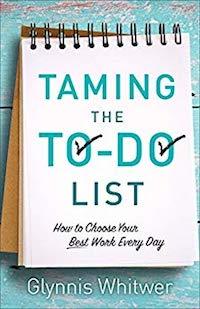 Taming Your To Do List by Glynnis Whitwer is a fast and easy read by a kindred spirit. Like hers, my to-do list is always longer than my arm and contains so many pressing matters that it’s sometimes difficult to know just where to begin.
Taming Your To Do List by Glynnis Whitwer is a fast and easy read by a kindred spirit. Like hers, my to-do list is always longer than my arm and contains so many pressing matters that it’s sometimes difficult to know just where to begin.
Her tips help readers kick procrastination and perfectionism to the curb, boil their endless lists down to a few essentials, and tackle those responsibilities with purpose and passion before moving on to the next thing.
Baby steps. Incremental but steady progress. That’s the key for any recovering addict, especially if you’ve made a habit of biting off more than you can chew.
12 Ways Your Phone is Changing You
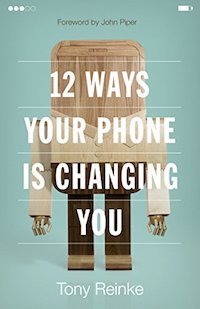 12 Ways Your Phone is Changing You by Tony Reinke is one of a handful of audiobooks I listened to this year, but it was SO GOOD that I ordered a hard copy the minute I finished so I could read it again and mark the passages I most want to remember. Which is basically the whole thing.
12 Ways Your Phone is Changing You by Tony Reinke is one of a handful of audiobooks I listened to this year, but it was SO GOOD that I ordered a hard copy the minute I finished so I could read it again and mark the passages I most want to remember. Which is basically the whole thing.
This frighteningly insightful book is a must read for anybody concerned about the toll our cultural obsession with being constantly connected is taking on us as individuals and as a society.
Happily, Reinke doesn’t stop with the bad news, but also offers constructive advice for combatting smartphone addiction without completely forgoing the benefits of this new technology.
Unstuffed: Decluttering Your Home, Mind & Soul
 Unstuffed by Ruth Soukup lays out a detailed plan for decluttering your life that really works. And Ruth doesn’t stop at clearing out closets, cabinets, and garages. She’ll also help you deal with the “clutter” on your calendar and in your soul.
Unstuffed by Ruth Soukup lays out a detailed plan for decluttering your life that really works. And Ruth doesn’t stop at clearing out closets, cabinets, and garages. She’ll also help you deal with the “clutter” on your calendar and in your soul.
Unlike some of the other decluttering authors I’ve read, Ruth writes from a Christian perspective, which provides a solid foundation for everything else she says. Our God is a God of order, and to the best of our abilities, we should reflect that aspect of His character in our homes and lives.
Taking God at His Word
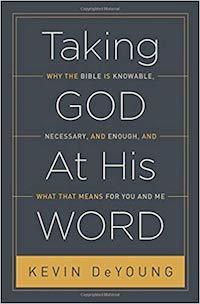 Taking God at His Word by Kevin DeYoung transported me back to my college days of Christian doctrine and hermeneutics classes. He takes a fascinating look at what the Bible says about itself and why we can study what it says with full confidence in its truth and authority as the Word of God.
Taking God at His Word by Kevin DeYoung transported me back to my college days of Christian doctrine and hermeneutics classes. He takes a fascinating look at what the Bible says about itself and why we can study what it says with full confidence in its truth and authority as the Word of God.
DeYoung offers a thorough yet easily understandable treatment of this important topic, explaining to readers in layman’s terms “why the Bible is knowable, necessary, and enough.” He ends the book with a recommended reading list for those who want to delve more deeply into the subject with books for every reading level.
Wit’s End: What Wit Is, How It Works, and Why We Need It
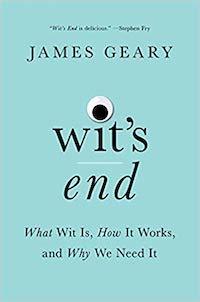 Wit’s End by James Geary examines a much broader definition of wit than quick quips and clever comebacks; it also explores such related topics as wisdom, resourcefulness, improvisation, inventiveness, serendipity, street smarts, banter, and the ability to look at things from a variety of perspectives.
Wit’s End by James Geary examines a much broader definition of wit than quick quips and clever comebacks; it also explores such related topics as wisdom, resourcefulness, improvisation, inventiveness, serendipity, street smarts, banter, and the ability to look at things from a variety of perspectives.
Every chapter is written in a style that perfectly complements the aspect of wit under consideration: the section on verbal repartee takes the form of a dramatic dialogue, the findings of neurological studies on wit are presented as a scientific paper, one chapter reads like the monologue of a standup comic, the next like a rap song, the next like a fable.
So that’s my top 10 list for last year’s non-fiction reads. I’ll be publishing a similar list for my fiction favorites from 2018 on our family blog soon.
Prefer to read non-fiction, like me? You can check out my favorites from previous years here.
Have you read any great books lately that really stand out from the rest? I’d love for you to share them with me in the comment section below. I’m all ears when it comes to reading recommendations!
The post Recommended Reads: My Top 10 of 2018 appeared first on Loving Life at Home.
January 3, 2019
Setting Goals for the New Year

Goals. Resolutions. Plans for the future. Call them what you may, but as a perpetual list maker, I have always loved the fresh start a New Year symbolizes. It’s a chance to dream big, to try harder, to weigh possibilities, and to tackle new challenges.
Sometimes my lists are mental. Sometimes I jot them in a journal. One year, I got really ambitious and typed them all out. The result? Seven full, single-spaced pages of heartfelt desires and long-term dreams I planned to work toward, broken down into categories (spiritual, mental, physical, social, etc.) and ordered chronologically (I intended to toilet train our children, for instance, before I teach them to drive).
Sadly, that was the same January my husband began a particularly grueling year of his medical training. Within weeks, I had to boil those seven pages of goals and resolutions down to two main objectives: (1) survive and (2) retain some vestige of sanity.
Nevertheless, making such a detailed list was a good exercise. As I review it now, nearly twenty-five years later, I marvel both at how consistent my goals have remained throughout all my married life and at what steady progress I’ve made toward accomplishing them, however small and incremental such progress may seem in the moment.
Little by little. Step by step. Precept upon precept. Our actions add up over time – for good or for bad.
[click image to download free printable]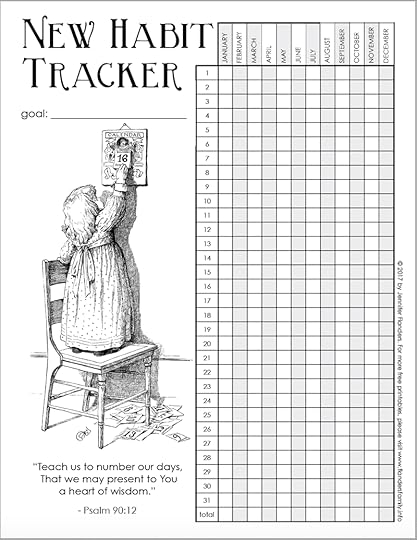
So now we’ve cycled around to January again. January is a great time to look back and evaluate.
As I reflect on last year’s resolutions, I can celebrate the fact that, by God’s grace, I managed to keep a few of them.
I’d set a goal of reading through the entire Bible in a year and finished with a few days to spare. I also purposed to read a book a week and write a letter a day. As of December 31, I’d read 52 books exactly (if I let the Bible count as one of them) and had penned – and mailed! – 388 handwritten notes.
Want some help reaching your goals this year? Check out my Life Balance Bundle. It’s a game changer.
Unfortunately, some of last year’s goals fell by the wayside. Or maybe I should say weigh-side, as the one at which I failed most miserably was losing the extra pounds I’ve been carrying around since the birth of my last baby – eight years ago! I’d hoped to drop 50, but instead managed to gain five. (Good thing I was working at it. No telling how much I might’ve packed on were it not for my sporadic calorie counting and portion control. Ha!)
But January not only provides a good opportunity to reflect on the past, it’s also a perfect time to prayerfully look toward the future. As we rethink and outline our goals for this New Year, let us plead earnestly with the Psalmist, “Lord, teach us to number our days, that we may gain a heart of wisdom.” (Psalm 90:12)
Each of us has only so much time, and that time keeps marching on, whether we’re running the race with endurance or sitting on the sidelines sifting through emails (preaching to myself, there), watching YouTube videos, or scrolling through social media updates.
Yet God has promised to supply all our needs (Philippians 4:19), and that means He has given us all the time required to fulfill His purpose for our lives. Twenty-four hours a day is neither too much nor too little. It is just right.
I came up with a little rhyme a few years back to remind me of this fact. Maybe it will resonate with you, as well:
If I can’t find the time to do
The things that I ought to do
It just means I’ve tried to do
Something God hasn’t called me to.
'If I can’t find the time to do the things that I ought to do, it just means I’ve tried to do something God hasn’t called me to.' - Jennifer FlandersClick To Tweet
So what would you like to accomplish in the coming year? Why not set a few goals and work toward them? Once those new habits have been firmly established, you can tackle a new challenge in another area of concentration.
I plan to keep up with my daily Bible reading and letter writing. By this point, those things have become as habitual to me as making my bed and brushing my teeth each morning.
Never one to give up easily, I’ve also put “getting in better shape” back on my list this year. But rather than judging my success by a number on the scale (which fluctuates widely depending on the time of day or month I step on said scale), I’m attaching this year’s objective to more easily quantifiable goals, including no between-meal snacking and a minimum of 12 minutes of intentional exercise a day.
I know what some of you are thinking: No wonder she gained instead of losing last year! But don’t laugh. Twelve minutes is better than zero. I need a goal that is both challenging (trust me when I say that, for me, this will be) and doable. I’ll check in with you again next January and let you know how it went.
The post Setting Goals for the New Year appeared first on Loving Life at Home.
December 21, 2018
Bad Haircuts & Rock Star Stylists

Photo by Adrian Motroc on Unsplash
The first Christmas my husband spent in medical school, the faculty wives decided to do something special for the student wives.
Knowing that most of us were living on a shoestring budget while our husbands were in training, they planned a spa night at an uptown Dallas salon where we could all get our hair and nails done on their dime. What a thoughtful and generous group of ladies they were!
I had never been to a such a swanky place in my life. Christmas music wafted through overhead speakers. Scented candles cast a soft glow over skirted tables laden with hors d’oeuvres for us to enjoy while we waited our turn.

Photo by Whitney Wright on Unsplash
Let’s get this party started
Expectations were running high. I fixed myself a plate, then walked toward the back of the studio where all the magic happened.
I’ll admit to being mildly alarmed, however, when I spotted the stylists. The majority were males who looked like they might’ve moonlighted in an 80’s rock band.
Several were already wearing the black leather pants. Slather a little makeup on them, and they could’ve easily passed for KISS or maybe Alice Cooper.

Photo by John Pratt on Unsplash
The one in charge sported a spikey shag haircut with purple highlights. No way am I going to let that guy touch my hair, I thought to myself as I assessed my other options.
There was only one conservative-looking employee in the whole place — a petite blonde with a sensible cut – so I approached her and asked if she’d be willing to give me a trim.
“Sure!” she enthused, “I’d be glad to.”
“Just take a little off the bottom,” I told her as she sat me in front of the mirror and tied an apron around my neck.

Photo by Matthew Henry from Burst
Sadly, the first strand of hair that fell in my lap was about eight inches long. By the time she was finished, I resembled a redheaded Rod Stewart – not at all the results I was hoping for.
Well, that didn’t go as expected
Sometimes, the longer you spend anticipating something, the harder it is to accept when things don’t turn out the way you envisioned.
What happened to me in the upscale salon that Christmas was, on a small scale, representative of something that transpired the first Christmas two thousand years earlier.
The majority of those who’d spent the most time watching and waiting for the Messiah assumed He would come as a triumphant conqueror or a victorious King. They never dreamed he’d show up as a humble babe in a lowly manger. They were expecting Him to sit on a throne, not die on a cross.
“There was nothing beautiful or majestic about His appearance, nothing to attract us to Him.” (Isaiah 53:2) And they were more than mildly alarmed at the thought of putting their trust in such a One to save them.
So they looked for a work around, assessing other options – just as I did that night with the rock star stylists.
Have you ever noticed how obsessed our society has become with self-improvement? A new diet comes out nearly every week. There’s a gym or exercise studio on every corner.

Photo by Matthew Henry on Burst
“Self-help” and “self-care” are now some of the most frequently searched terms on the Internet. And pop-psychology books are almost guaranteed bestsellers.
Jesus tells us He came that we “might have life and have it more abundantly.” (John 10:10) He promises to cleanse us from our sins and wash us white as snow, if only we’ll let Him.
Although He is the only one who can save us, we’ve spurned His gracious offer and sought instead a way to save ourselves.
To better our own lot.
To enjoy abundant life, but without any accountability.
Dead men don’t revive themselves
If you learn anything from my salon experience, let it be this: When you reject a gift because you don’t like the way it’s wrapped, you risk missing out on something amazing. A bad haircut will eventually grow out, but there’s no do-over for a misspent life.
The purpose and meaning and satisfaction we crave will never be found in a fad diet. Or a yoga class. Or a speed reading course. Or a de-cluttered closet. Or a botox injection.
And it certainly won’t be found in a fancy new hairdo.

Photo by Daria Shevtsova on Pexels
Which brings me back to the rest of my story. That cold December night in the Dallas salon taught me an important lesson about making assumptions.
As I sat with a mountain of hair growing in my lap, I overheard a girl in the next chair arguing with the stylist I’d tried so hard to avoid.
“Lop it all off,” she commanded, tossing her waist-length tresses over her shoulder, “I’m ready to do something drastic!”
The idea clearly upset Mr. Purple Spikes. “But your long hair is so beautiful,” he cajoled. “Why don’t I just take a little off the bottom?”
Meanwhile, the bright-eyed blonde who was massacring my mane made a startling confession. “This is actually the first time I’ve ever cut hair,” she proclaimed proudly. “I normally just shampoo.”
The post Bad Haircuts & Rock Star Stylists appeared first on Loving Life at Home.
December 14, 2018
Health Watch: Time to Schedule a Screening Colonoscopy
I had my first screening colonoscopy this week. My husband made the appointment for me when he called to schedule his own.
I’m all for dating your mate. And I’m normally delighted when my husband plans something special for us to do together.
But having side-by-side colonoscopies is decidedly not my idea of romance.

Whatever happened to dinner and a movie?
Still, Doug would not be deterred. He turned 50 last year — the age at which doctors advise having an initial screening — and decided he had put it off long enough.
As I turned 50 two full years before that, I suppose he thought I’d put mine off long enough, as well. He probably also gave up on my ever making the necessary phone call to schedule one on my own.
“But,” he insisted, “this is something we both need to do.”
In the past twelve months, we’ve had three close friends whose own routine colonoscopies uncovered cancer in various stages.
Doubtlessly, that fact added to my husband’s sense of urgency about the matter — especially considering all three friends are younger than we are.
Such news underscores the serious consequences we might face should we put this procedure off any longer. While pre-cancerous polyps can be removed quickly and easily during these routine screenings, when allowed to grow undetected, they can turn into something far more menacing and malignant.
So while Doug was making the necessary arrangements for his colonoscopy, he took it upon himself to schedule one on my behalf, as well. ASAP. While we have time off for the holidays.
Merry Christmas! Pass the Malox.
Romance aside, this was definitely a bonding experience. The two bathrooms nearest our master bedroom share a wall, which kept us side-by-side for the prep work, too.
For the twenty-four hours prior to the procedure, neither of us strayed far from that adjoining wall. That didn’t exactly afford the ambiance of a candlelit dinner, but it did provide a common goal and forged in us something akin to battlefield camaraderie.
I could certainly sympathize with what my husband was going through, and vice versa.
You might think it a case of misery loving company, but it honestly wasn’t that bad. Neither the prep nor the procedure was anything near the nightmare I’d expected.

I will admit to being a little nervous beforehand about what the doctor might discover during the screening itself. My prayer going in was that whatever should be found would be found.
The fact that Doug had been so adamant that I get this done made me wonder whether God might’ve put it on his heart to ensure early detection of something that would’ve been a bigger problem had I waited.
That’s the main reason I went along with his plan: Because I love my husband and know he loves me. Because I respect his opinion and trust him to do the right thing. And because we both hope to grow old together.
After 31 years of marriage, I can attest to the truth of that old adage, “The couple that prays together stays together.”
After the events of this week, I’ve thought of a corollary to this theorem:
“The couple that hopes together, scopes together.”
Granted, it’s unlikely that will ever enjoy the popularity of the other platitude, but it deserves some consideration, nonetheless. Are you or somebody you love overdue for your screening colonoscopy?
The post Health Watch: Time to Schedule a Screening Colonoscopy appeared first on Loving Life at Home.
December 8, 2018
Embarrassing Moments & Christmas Decor

About fifteen years ago — and totally unbeknownst to me at the time — my husband used his new smart phone to take a video of one of our babies, fresh from his bath and all dressed for bed.
Little Isaac looked so sweet and rosy toddling around the bathroom in those footed pajamas that Doug couldn’t resist passing the clip around the hospital the following day.
Surgeons, nurses, scrub techs, housekeeping staff — almost everyone he knows had seen the footage before he bothered showing it to me.
When he finally did, I was mortified.
He had obviously paid no attention to camera angles when filming and had unwittingly captured me in the background.
If you looked closely, you could see me clearly over the baby’s bobbing shoulder — sitting on the toilet with my pants around my ankles!

Of course, I had to forgive him. Doug swore he hadn’t even noticed the background image. “Although,” he mused playfully, “that would explain all the sniggering in the O.R. today!”
I’m just grateful he didn’t post the clip on YouTube.
Fast-forward Fifteen Years
Like almost everyone else we know, our family has spent the past week decking our halls with boughs of holly. We’ve hung stockings on the mantle and wreaths on the doors, put up trees, strung lights, wrapped gifts, and arranged nativity scenes and Christmas Villages on shelves and sideboards and end tables.
My grandkids helped hang the ornaments on our Christmas tree this year. Some of those decorations are ten or twelve times older than they are. And they’re accustomed to being handled more gently than some of their little fingers could manage.
Long story short, I now have a small box full of these forlorn trinkets and treasures in the corner of my closet awaiting repairs. Repairs I’ve been attending to in small snatches of time as I’m able.

I had a few such moments last Saturday evening. My husband and I were scheduled to attend a Christmas party together, and I was dressed and ready to go before he’d even started washing up.
And so I was sitting, hunched over my desk, attaching new hangers to old ornaments, in full view of my husband as he stepped out of the shower and started toweling off.
Water in His Ears
“What are you doing in there, Honey Love?” he asked while swiping at the drips on the bathroom floor.
“Trying to tie strings,” I called over my shoulder, carefully concentrating on the task at hand.
“Trying to live stream!?” he exclaimed incredulously as he darted around a corner to hide. “Can’t you see I’m buck-naked in here?”
Obviously, the man can dish it out, but he can’t take it.
Once I assured him I was not, in fact, broadcasting his bare, buff body to all my Facebook friends, we had a hearty laugh about the misunderstanding.
Although he admits it probably would’ve served him right. Payback time!
God Have Mercy
For someone who felt utterly embarrassed to learn, as I did recently, that I’d taught an hour-long co-op class to high schoolers with my pants unzipped, the thought of being completely disrobed in public is almost more than I can bear.
That’s the stuff nightmares are made of.
Have you ever had that dream? The one where you arrive at work or school or church only to realize in alarm that you left all your clothes at home?
Yet every Christmas, we celebrate the fact that Jesus did that for us.

He left the splendor of heaven and arrived on earth as a tiny, vulnerable, naked little babe, whereupon his mother toweled him off, swaddled him snugly, and laid him in a manger.
“Although He existed in the form of God, [Jesus] didn’t regard equality with God a thing to be grasped, but emptied Himself, taking the form of a bond-servant, and being made in the likeness of men. Being found in appearance as a man, He humbled Himself by becoming obedient to the point of death, even death on a cross.”(Philippians 2:6-8)
Not only was Jesus naked when He was born; He was naked when He died. Exposed. Humiliated. Scorned. Rejected. Despised.
He Died for Our Sin
Jesus took my place and yours, suffering unimaginable torment in our stead. He endured that nightmare so that we wouldn’t have to.
As we celebrate our Savior’s birth this season, let us be mindful of the fact that He was born to die.
Let us accept with gladness the gifts He offers – eternal life and the forgiveness of sin.
And let us be careful, when we’re capturing all those happy holiday moments on film, that there aren’t any naked, unsuspecting spouses haplessly tending to their business in the background.

The post Embarrassing Moments & Christmas Decor appeared first on Loving Life at Home.




